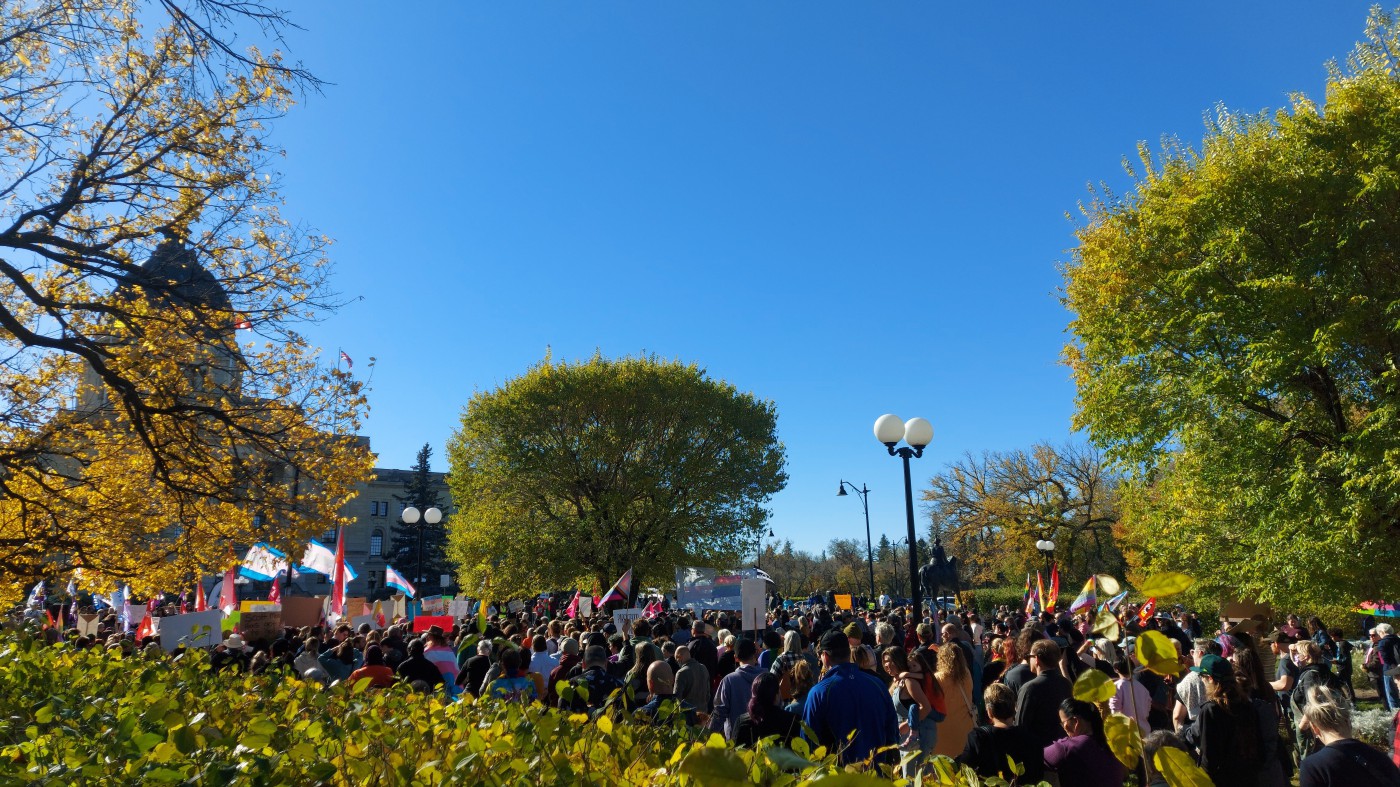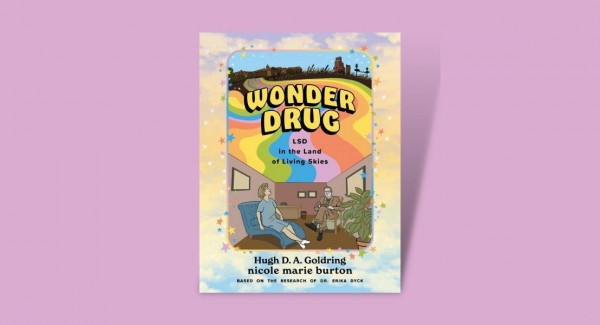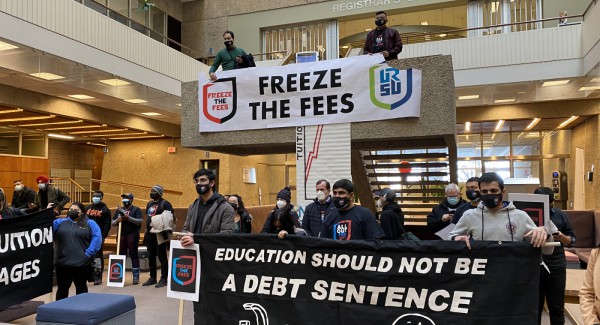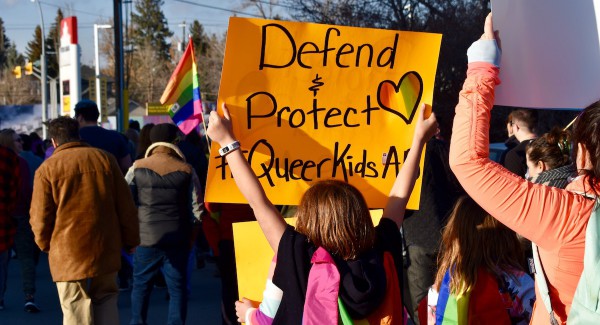The far-right web behind the parents’ rights movement

On Oct. 10, 2023, hundreds of protesters gathered outside the Saskatchewan legislature to show their support for trans and queer children and to oppose the Sask Party’s Parents’ Bill of Rights legislation. Photo by John Cameron.
“I belong to my parents,” read signs held up by children at “parents’ rights” rallies across the country on Sept. 20. “We are here to fight for our kids. We don’t want them to be sexually indoctrinated at young ages,” Saskatoon demonstrator Sandi Kullman told CBC. “How two men or women have sex, should that be in books out there in libraries and schools? It’s just disgusting.”
The 1 Million March 4 Children rallies drew hundreds in Saskatoon and Regina and thousands more across the country on the heels of two parents’ rights victories: in August, Saskatchewan and New Brunswick implemented policies requiring parental consent for kids under 16 to change their gender identification at school. While protesters numbered in the thousands nationwide, they were vastly outnumbered by counter-protesters in many marches across Canada.
Saskatchewan Premier Scott Moe recalled the legislature early on Oct. 10 to introduce the Parents’ Bill of Rights, which invokes the notwithstanding clause of the Charter of Rights and Freedoms, keeping his policy alive in the face of a court injunction. “We are not backing down,” he tweeted in response to the backlash to the policy. Less than a week later, one of Saskatchewan’s six human rights commissioners, Heather Kuttai, resigned in protest.
In her resignation letter, Kuttai wrote the policy “is something I cannot be a part of, and I will not be associated with a provincial government that takes away the rights of children, especially vulnerable children.”
Placing parents’ rights to control their children’s knowledge, expression, and health care over children’s rights to learn, express themselves, and access support is an assertion of property rights — of ownership — over children. Parents’ rights discourse may seem new, but it has been used against 2SLGBTQIA+ communities for decades. The resurgence of this discourse now comes in response to gains in rights and acceptance of 2SLGBTQIA+ communities — COVID-19 agitators and others on the extreme right wing are pivoting to this issue to maintain the outrage of their base and attract new converts. Because of this, understanding the roots of Saskatchewan’s new policy and the “parents’ rights” movement will be key to fighting for trans kids’ safety.
Gender ideology, social contagion, and the 2SLGBTQIA+ “threat”
“Parents’ rights” is a big tent. It includes Gays Against Groomers (GAG), an LGB hate group that, by including other members of the 2SLGBTQIA+ community, shields anti-trans campaigns from accusations of bigotry. It also includes groups like those behind the 1 Million March 4 Children, which says it isn’t anti-2SLGBTQIA+ even though one of the march’s organizers, Mahmoud Mourra, has been charged with hate-motivated criminal harassment. In one of his YouTube videos, Mourra says, “If you like to give it, or you like to shove it, if you like to lick it, or you like to suck it, it doesn’t matter to us ... Decide to do it behind your door and live with it.” Other groups, like Action4Canada, believe there is a “radical LGBTQ agenda” whose “objective is forced compliance and acceptance of their adult sexual proclivities and ideologies.” This conspiracy involves the United Nations, big pharma, “the globalists” and the “climate change hoax,” and has goals of “population control.”
A recurring idea among many groups is that 2SLGBTQIA+ identities are, as Action4Canada founder Tanya Gaw says, “a social contagion where children are identifying as the opposite sex because of them indoctrinating [kids] in the school system.” They believe that exposure to ideas about queer and trans people has led to a marked increase in the number of 2SLGBTQIA+ people — especially trans people — rather than increased visibility and safety leading to an increasing number of 2SLGBTQIA+ people publicly identifying as such. In their eyes, 2SLGBTQIA+ identities are a “social contagion,” and therefore the 2SLGBTQIA+ movement is not “a genuine civil rights movement.”
When Mourra says “we cannot accept forcing [2SLGBTQIA+ identities/existence] on our society,” he is calling for the invisibilization of 2SLGBTQIA+ people and communities. Cait McKinney, a queer and non-binary assistant professor of communications at Simon Fraser University, said in an interview that this position denies 2SLGBTQIA+ peoples’ “right to exist in society and access fundamental services like public education, health care and public space, or to be able to have loving relationships like parent and child or mentor and mentee with young people” – all of which are crucial for the health and well-being of 2SLGBTQIA+ kids and communities.
Proponents of the social contagion theory are trying to control children’s sexual orientation and gender identity (SOGI). This includes asserting the “parental right” not to allow trans kids to transition.
For those who believe that 2SLGBTQIA+ identities are a “social contagion,” working to keep their kids from being exposed to SOGI is a (futile) endeavour to control their children’s sexualities and gender identities. This is an assertion of parental property rights over children. “Fundamentally, children belong to parents, not Governments,” says the ultra-right Freedom Party of BC. In order to achieve their property rights, they override the rights of their children, other children, and all 2SLGBTQIA+ children. These aren’t theoretical rights. They impact people’s safety and even their lives.
Dominion over children
The recognition of children’s rights is relatively new. According to Roman law, men were considered to have total dominion over their children (and enslaved people), including having the right to kill them because they were considered their property. Early child protection work in several communities across Canada was done by animal protection agencies because they had similar status as property (albeit with some emergent rights).
The vestiges of children as property can still be found in Canadian law. The Criminal Code says parents charged with assault can use a defence of “correction of child by force.” When challenged at the Supreme Court of Canada in 2004, parental rights organizations formed a coalition to intervene to keep this defence. The Court upheld the law, which dissenting Justice Deschamps called a “throwback to old notions of children as property … [that] sends the message that [children’s] bodily integrity and physical security are to be sacrificed to the will of their parents.”
“Parents’ rights” have been mobilized against the 2SLGBTQIA+ community since at least the 1970s, when they were used in California to try to get schoolteachers fired for “public homosexuality.” Anti-2SLGBTQIA+ campaigner and politician John Briggs’ rhetoric in 1978 was strikingly similar to what can be heard today: “Most of them are in the closet. That’s where I think they should remain.”
In 1997, the Citizens’ Research Institute (CRI) opposed curriculum about the harms of homophobia and heterosexism and supported a book ban under the banner of parents’ rights. It even drafted a declaration asserting parental (property) rights to keep their children away from material depicting 2SLGBTQIA+ people as “normal, acceptable or … tolerated.”
Parents’ rights movements are pulling from an old playbook. Many parents’ rights groups conceal basic information about themselves, including their leadership. However, it is evident that while some of these groups are new, what may seem like an emerging, grassroots parents’ rights movement has deep ties on the right and links to anti-vax, anti-mask and white supremacist movements.
New Brunswick’s Don’t Delete Parents, a self-described “grassroots movement of common sense for families,” appears to have been recently formed, but was actually founded by prominent right-wing Christian YouTuber Faytene Grasseschi. The group runs on the administrative support of 4 My Canada, which was active around “parents’ rights” to keep children unvaccinated. Parents As First Educators also supported keeping kids unvaccinated — that group was headed by Tanya Granic Allen while she ran for leadership of the Ontario Progressive Conservative (PC) Party. Allen put forward the successful 2018 Ontario PC Party resolution that “gender identity theory is unscientific” and won’t be recognized.
Action4Canada takes credit for Saskatchewan’s anti-trans school policy, claiming they mobilized people to send 10,000 emails in support of the policy to the Saskatchewan government. The group claims to have nine local chapters in Saskatchewan, but they refuse to provide names of chapter leaders and say only Gaw is allowed to speak to the media. Gaw, who wouldn’t be interviewed for this article, founded Action4Canada in 2015. Gaw was involved in an anti-pride flag protest in 2019 with Kari Simpson from Culture Guard, who has been organizing since at least the late 1990s, including with CRI. They both attended a demonstration in support of the far right, anti-Muslim Yellow Vests Canada in 2019. Along with Simpson, members of the hate group Soldiers of Odin have been present at anti-SOGI rallies; Simpson reportedly brushed aside concerns about the group as “probably overplayed.”
Many anti-vax and fringe COVID-19 denial groups have expanded to pushing for parents’ rights and opposing SOGI-related education. Stand4THEE, the group that sought to have Prime Minister Justin Trudeau arrested for treason for his treatment of the Freedom Convoy, now campaigns against gender inclusion. Saskatchewan organization Unified Grassroots (UG) formed in opposition to school COVID safety policies and now appears to be inactive, aside from its presence on X (formerly Twitter) where it promotes anti-trans and parents’ rights content. So do infamous anti-vax activist Chris Sky and UG founder Nadine Ness, who is from Langham, Sask.
The real threat
The most immediate danger these organizations and the policies they advocate pose is to trans kids. School policies that out kids or force them to stay in or return to the closet put trans kids at risk. The existence of 2SLGBTQIA+ people requires total erasure for many anti-SOGI groups. This means no 2SLGBTQIA+ anti-bullying or inclusion education, no talking about 2SLGBTQIA+ parents, no pride flags, and maybe no bathroom access for trans kids.
There is a growing climate of hate and violence against 2SLGBTQIA+ people in Canada, especially trans people and BIPOC. This is made more palatable to the public through open debate that undermines 2SLGBTQIA+ and especially trans peoples’ basic dignity. Trans youth have high rates of suicide; supportive families and gender-affirming care protect against this.
Concerns about 2SLGBTQIA+ students’ safety are often disregarded by anti-SOGI advocates. In an interview with True North, Grasseschi said “we need to cultivate a system that believes the best about parents.” This would require ignoring the experiences of 2SLGBTQIA+ people who have experienced violence and trauma in their homes and schools. Half of students who are not straight or perceived as not straight, and three-quarters of trans students, feel unsafe at school. Things don’t seem to be better at home: 2SLGBTQIA+ youth make up 25-40 per cent of unhoused youth in Canada. McKinney says they feel heartened by how many people have come out to counter-protest, but that it is “also a sign of how traumatic so many of our upbringings were.”
Fringe groups “salaciously incite hate and work to bring people who are kind of in the middle onto their side” by having their messages picked up and publicized by the popular press, McKinney says. Now that the parents’ rights issue has gotten significant coverage and been somewhat sanitized, “populist governments are jumping onto this issue in order to win votes,” they explain, “and it’s really troubling.”
The Regina Civic Awareness and Action Network (RCAAN) draws people to the group through the now-legitimized parents’ rights issue. At first glance, their website appears relatively benign; however, a deeper search reveals its racist and cisheterosexist dog whistles. At a recent meeting, RCAAN member Zach Schmidt told attendees that COVID was a “psy-op” and not to “be afraid to be called a bigot, transphobe, homophobe, Nazi, far right extremist.” Schmidt promotes the group on his podcast The Schmidt House where he says they work far beyond parents’ rights to “spread the message of freedom.”
At a recent protest, an anti-SOGI protester wore an orange t-shirt that said, “truth sounds like hate.” But the truth is that hate sounds like hate, and queer and trans people and allies know this. On Oct. 10, 2023, hundreds rallied in support of trans kids in Regina. A smaller counter-protest yelled “leave our kids alone” but was overpowered by the hundreds chanting “love not hate” and waving trans flags. This is a struggle over who defines truth and who gets to love, but it is also a battle over the very nature of property and, consequently, who is human.




